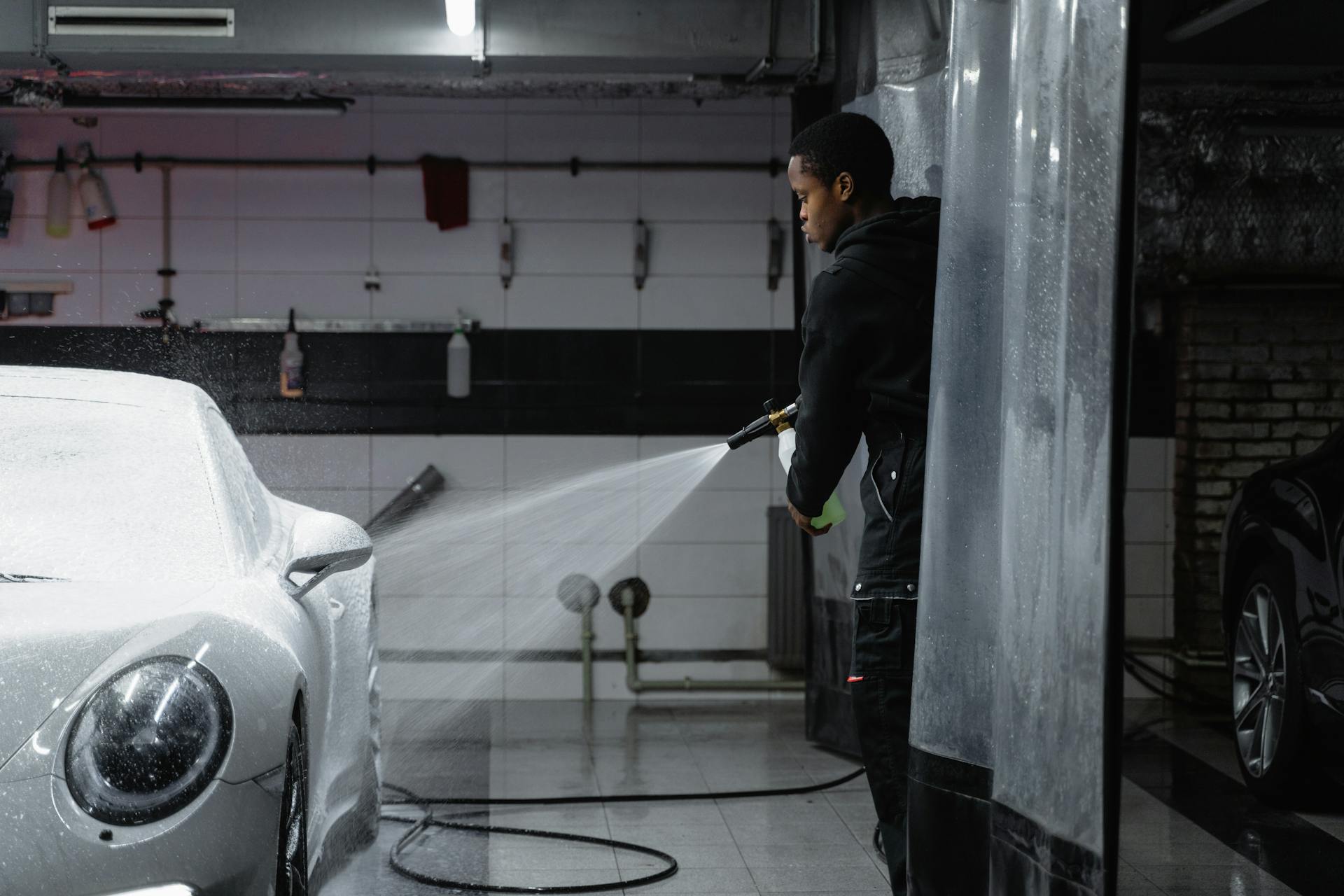
Choosing the right pressure washing business insurance policy can be overwhelming, but it's a crucial step in protecting your investment. There are many types of policies to consider, including liability, equipment, and workers' compensation insurance.
Liability insurance, for example, can help cover costs associated with accidents or property damage. This is especially important for pressure washing businesses, as the use of high-pressure water can cause significant damage if not handled properly.
In addition to liability insurance, equipment insurance can help protect your business from financial losses if your equipment is damaged or stolen. This can include power washers, generators, and other essential equipment.
By carefully selecting the right policy, you can ensure your business is protected from unexpected events and continue to operate smoothly.
You might enjoy: Business Equipment Breakdown Insurance
Why Businesses Need Insurance
As a business owner, you want to protect your pressure washing business from potential risks and expenses. A single accident or lawsuit can be devastating, but with the right insurance coverage, you can reduce or eliminate the impact of these risks on your business.
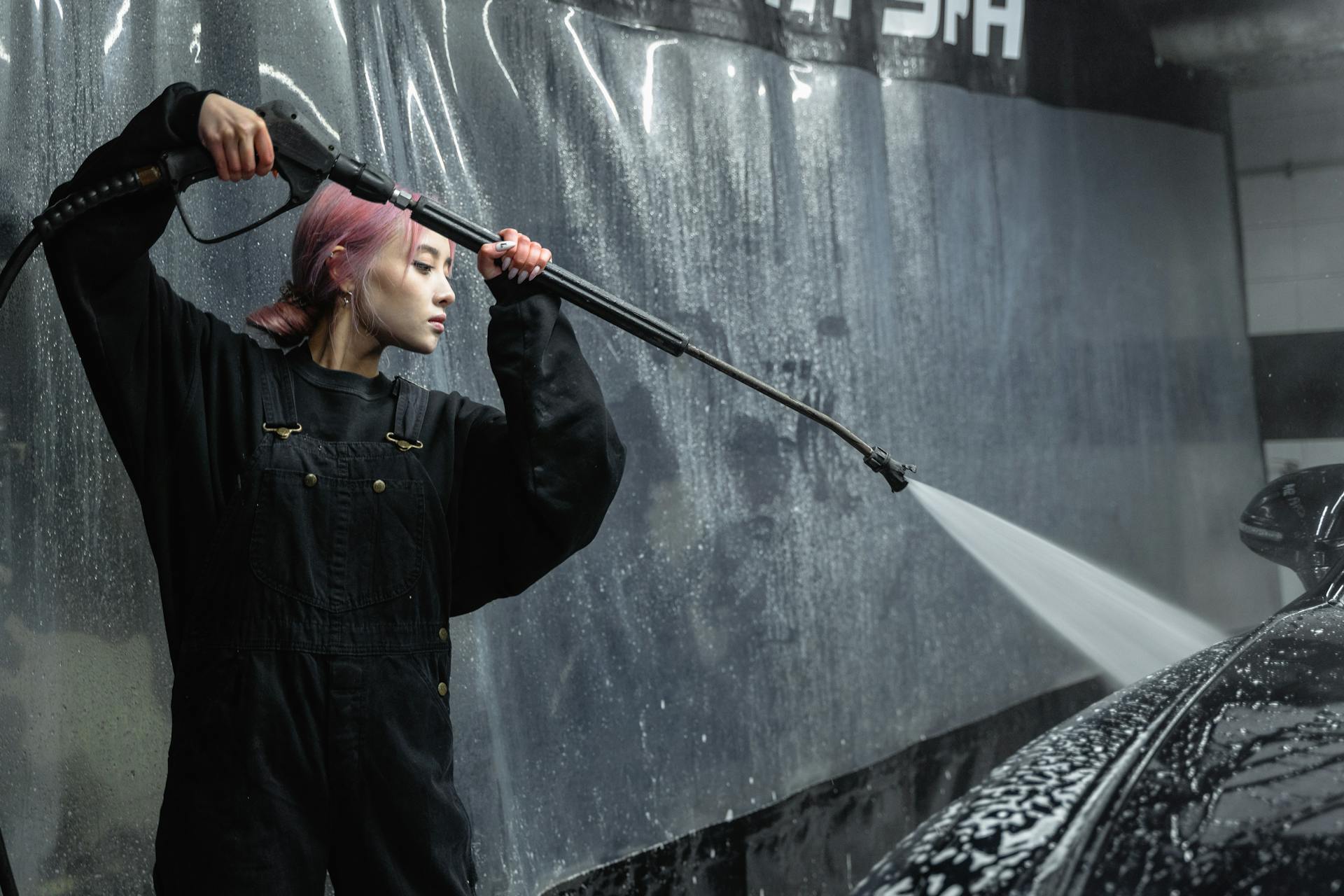
Pressure washing businesses involve high-pressure water and chemicals, which can lead to damages and accidents. This is why insurance is crucial to cover property damage, injury to third parties, and legal defense costs.
If a client sues you for injuries or professional negligence, you may face expensive legal expenses and judgment costs. In fact, you could end up owing hundreds of thousands of dollars to a client.
General liability insurance is essential to prevent such claims and expenses. It can cover up to $1 million in liability, which is often the minimum required by states and clients.
To determine the optimal insurance coverage for your business, it's best to talk to an insurance agent or broker. They can help you assess your business risks and determine the right coverage for your needs.
Here are some common risks that pressure washing businesses face:
- Liability for broken glass on a client’s property due to flying debris from the water.
- Customers tripping over pressure washer equipment or hoses.
- Data breaches that compromise data or customers’ private information.
- Employees getting back injuries or slipping and falling on the job.
Assessing your business risks and determining the right insurance coverage can help you stay afloat and handle claims against you.
Types of Coverage
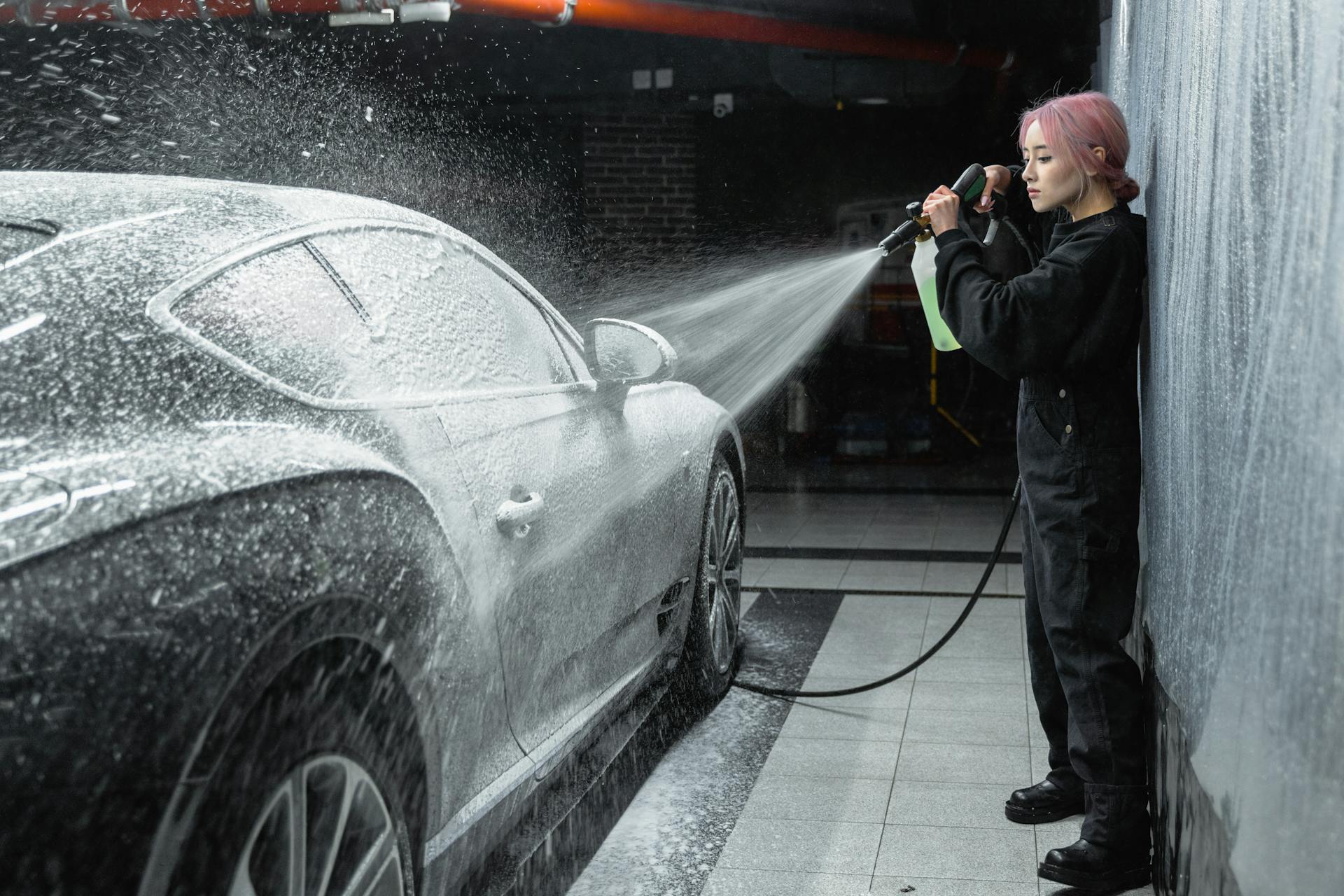
Pressure washing business insurance can be complex, but understanding the types of coverage available can help you make informed decisions. General liability insurance covers claims against your business for third-party bodily injury, property damage or personal and advertising injury.
You may also need workers' compensation insurance to cover employees who are injured or get sick at work. This is typically required by most states. Commercial property insurance protects your business and its contents from damage due to natural disasters, fire, smoke, or vandalism.
Here are some common types of pressure washing insurance coverage:
Business interruption insurance can also help if your business is unable to operate due to a disaster, covering lost income if you temporarily close. Professional liability insurance (E & O) protects against claims of mistakes, negligence, or inadequate work.
Workers Compensation
Workers Compensation insurance is a crucial type of coverage for pressure washing businesses. Most states require employers to get workers' comp insurance for employees, which pays for medical bills and lost wages in case of employee injury during work activities.
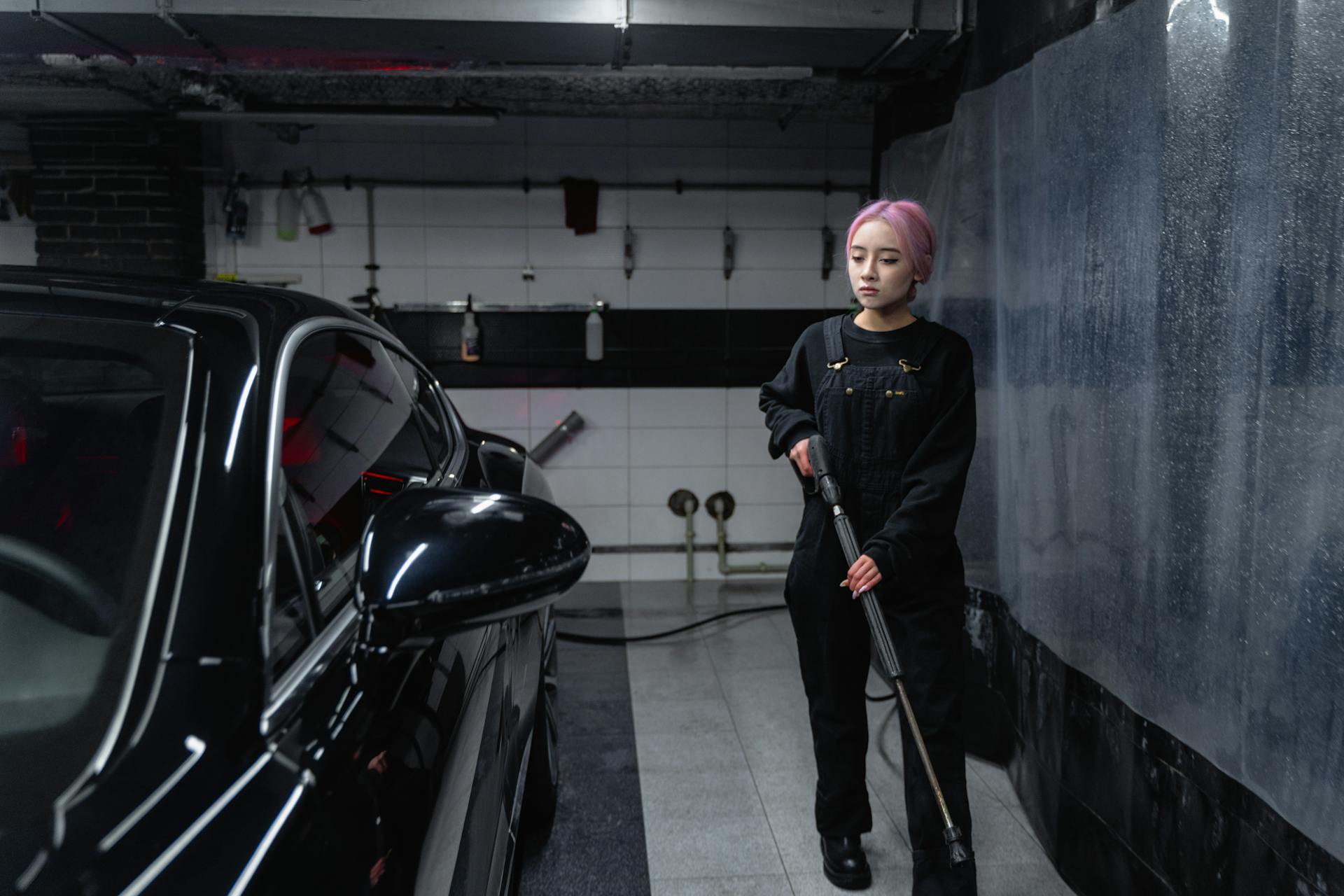
In some states, businesses must have this type of insurance for permanent and temporary staff. Workers' compensation insurance can cover medical expenses and help recoup lost wages if an employee falls ill due to exposure to cleaning chemicals.
If you have employees, you'll likely need to purchase workers' compensation insurance. This type of insurance is essential for preventing devastating claims and expenses.
Here are some key facts about workers' compensation insurance:
Workers' compensation insurance is a must-have for pressure washing businesses with employees. It's essential for preventing costly claims and expenses, and for ensuring that employees receive the medical care and support they need in case of an injury.
Berk
Berk is a great option for small businesses looking for affordable insurance. biBERK Insurance, a Berkshire Hathaway company, offers specific coverage tailored to small businesses.
Their small business insurance can help you scale your needs as your business grows. This makes it an excellent option for growing businesses in need of general liability insurance.
biBERK is known for providing low-cost insurance that still offers adequate financial protection. This can be a game-changer for small businesses on a budget.
If this caught your attention, see: Insurance Cover on Business - Merchant Services
What Are the Best?
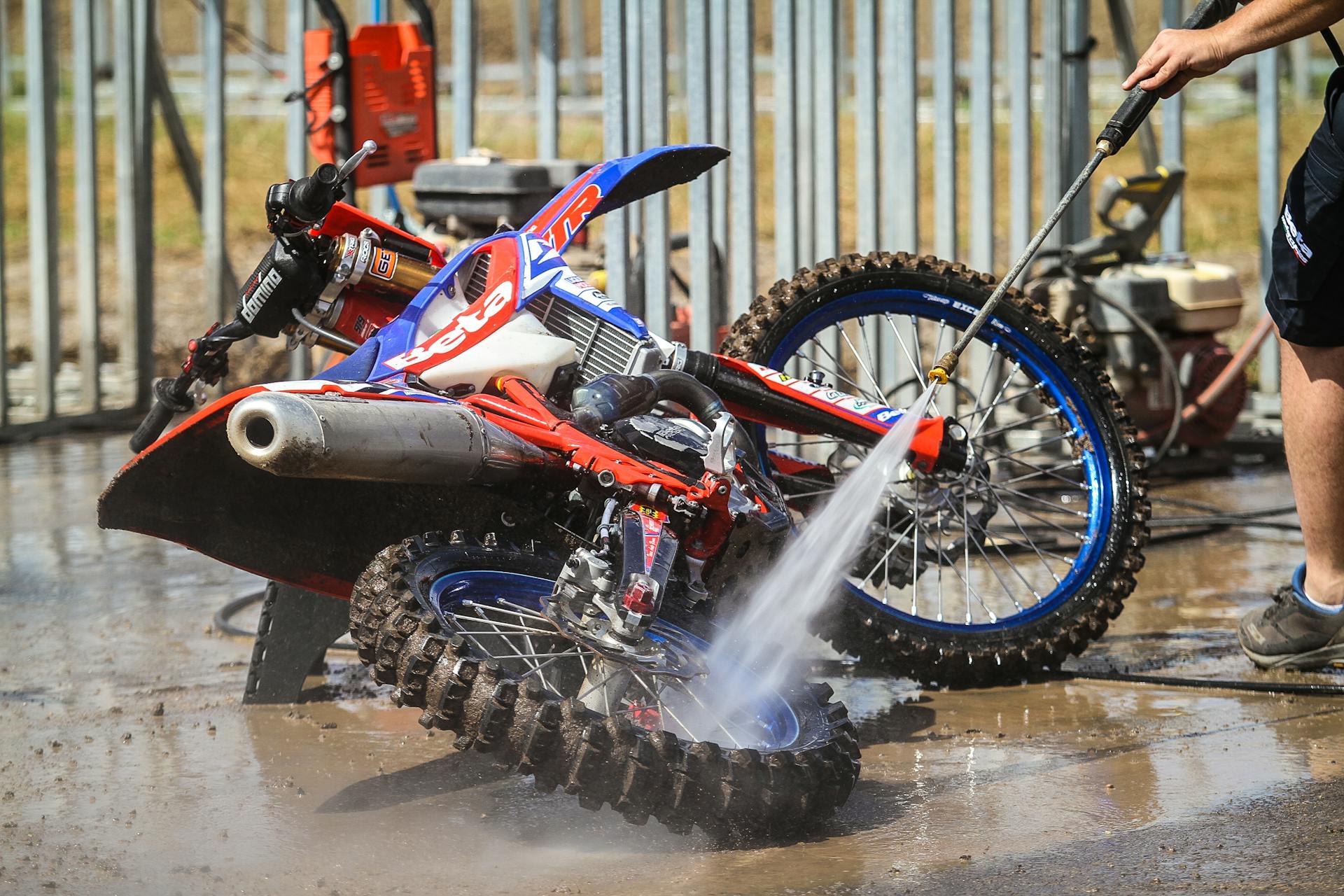
If you're looking for the best types of coverage, it's essential to consider the options that provide the most comprehensive protection.
Liability coverage is often considered the best for small business owners, as it protects them from financial losses due to lawsuits and other legal issues, with an average cost of $500 per year.
Accident coverage is a must-have for individuals with a history of accidents, as it helps cover medical expenses and lost wages, often costing around $150 per month.
Umbrella coverage is ideal for those who want extra protection beyond their standard policy limits, typically costing between $100 and $300 per year.
Business interruption coverage is a game-changer for entrepreneurs, helping them stay afloat during unexpected closures, often costing around 5% of their annual revenue.
You might like: Business Protection Insurance
Finding the Right Policy
Finding the right policy for your pressure washing business can be a daunting task, but it's essential to protect yourself and your business from potential risks. You'll want to consider general liability insurance, which covers claims against your business for third-party bodily injury, property damage, or personal and advertising injury.
To determine the specific types of insurance you need, think about the services you offer and the equipment you use. If you're using high-pressure water and chemicals, you'll want to consider property damage insurance, which covers damage to client property during your power washing operations. This is especially important if you're working with sensitive surfaces or equipment.
Here are some common types of insurance you may need:
By understanding the different types of insurance available and what they cover, you can make an informed decision about which policies are right for your pressure washing business.
Efficient Small Commercial E&S Placement
Finding the right policy for your pressure washing business can be a daunting task, but it doesn't have to be. By understanding the types of insurance you need, you can efficiently place small commercial E&S, also known as excess and surplus, insurance.
General liability insurance is a must-have for any business that can be held accountable for third-party bodily injury, property damage, or personal and advertising injury. This type of insurance can be added to your homeowners policy if you operate your business out of your home.
Broaden your view: Nationwide Life Insurance Company Tobacco Policy
You'll also want to consider workers' compensation insurance, which covers employees who are injured or get sick at work. Most states require employers to get workers' comp insurance for employees.
Commercial property insurance is another essential policy that covers damage to your business and its contents due to natural disasters, fire, smoke, or vandalism. This can include a tornado destroying your warehouse.
A business owner's policy (BOP) can be a cost-effective way to bundle multiple types of insurance, including general liability, commercial property, and business interruption insurance. BOPs can be customized to meet your business's specific needs.
Here are some common types of insurance policies for pressure washing businesses:
Choose Policies and Coverage
Deciding what policies and coverage you need is a crucial step in finding the right insurance for your pressure washing business.
General liability insurance is a must-have, as it covers claims against your business for third-party bodily injury, property damage, or personal and advertising injury. You might be able to add a liability endorsement to your homeowners policy if your business is based out of your home.
Workers' compensation insurance is also essential, especially if you have employees. This type of insurance covers employees who are injured or get sick at work, and most states require employers to get workers' comp insurance for employees.
Commercial property insurance protects your business and its contents from damage caused by natural disasters, fire, smoke, or vandalism. Business interruption insurance covers lost income when your business is unable to operate due to a disaster.
You may also need commercial auto insurance if you use vehicles for business purposes. Professional liability insurance, also known as errors and omissions insurance, is necessary if your business provides services to customers for a fee.
To determine which policies and coverage you need, consider the specific risks your business faces, such as liability for broken glass on a client's property or customers tripping over equipment. Review your business risks and think about the types of lawsuits, mistakes, accidents, or natural disasters that might affect your business.
Here are some common types of insurance policies for pressure washing businesses:
Frequently Asked Questions
How much is $1,000,000 liability insurance?
The average cost of a $1 million liability insurance policy is around $500 per year, with some customers paying as little as $30 per month. Find out how you can get a quote and save on your liability insurance today.
How much is a $5 million dollar insurance policy for a business?
A $5 million business insurance policy typically costs between $375 to $525 per year, extending your existing liability coverage with an extra layer of protection.
How much should commercial general liability insurance cost?
The average annual cost of commercial general liability insurance is around $805, but costs can range from a few hundred to a couple thousand dollars per year. To get an accurate quote, businesses should request a personalized estimate.
What licenses are needed to start a pressure washing business?
To start a pressure washing business, you'll need to obtain a Business License, Occupational Business License, and a Pressure Washing License (if required in your state). Check your state's regulations for specific licensing requirements and bond information.
Sources
- https://www.linkedin.com/pulse/pressure-washing-insurance-what-you-need-know-pathpointinsurance
- https://coterieinsurance.com/blog/pressure-washing-business-insurance/
- https://insuranceranked.com/business-insurance/best-pressure-power-washing-insurance
- https://www.nerdwallet.com/article/small-business/pressure-washing-insurance
- https://www.zensurance.com/contractor-insurance/pressure-washing
Featured Images: pexels.com


